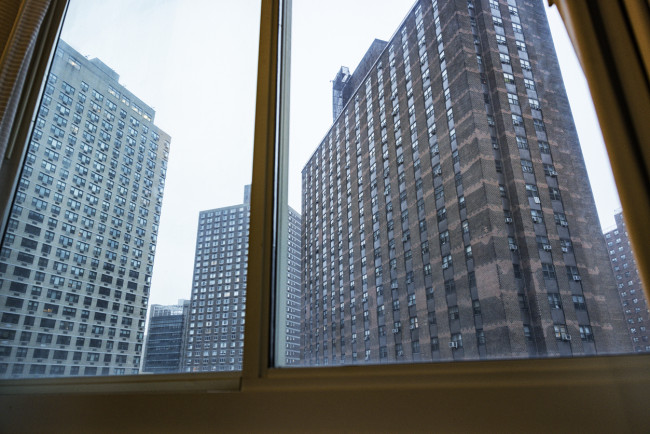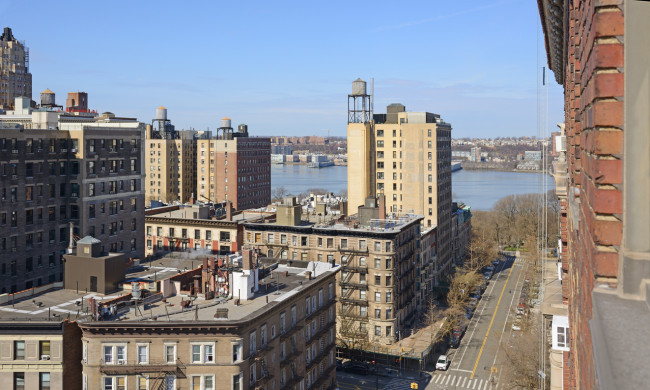Private listings: What NYC sellers and buyers need to know about the off-market controversy
- Compass's new emphasis on a strategy used to test pricing has touched off a major debate
- The result is a lot of noise and competing claims about fairness and transparency

The NYC market differs from the rest of the U.S. Brokers here are members of REBNY, which allows for flexibility in marketing private listings.
iStock
Testing the market with a private listing is no longer just for celebrity and high-net worth sellers. Major real estate firms are leaning into this option with new platforms designed to work with a broader number of sellers.
It’s an appealing proposition for sellers who want to test an aspirational price, or for those who have a personal situation and need more privacy, like caregivers or couples going through a divorce.
Lining up in opposition are other real estate firms, as well as listings sites and consumer advocates, who say exclusive listings reduce transparency and competitiveness, and open the door to Fair Housing violations. [Update: On May 1st, StreetEasy added stronger language about private listings to its listings standards and said it would withhold access to its features to agents that do not comply; more details below.]
The result is a lot of noise and competing claims about private listings. Read on for what New York City sellers and buyers need to know about the new private listings debate, including questions they should ask brokers.
Why are private listings such a hot topic?
In recent months, one of the U.S.’s largest brokerages, Compass, has been promoting a new, three-phase strategy for sellers that begins with listing properties privately, viewable only by buyers represented by Compass agents. And earlier this year, Corcoran and Douglas Elliman announced plans to launch their own platforms for agents to market listings internally, The Real Deal reported.
Private listings—also known as pocket listings or private exclusives—have long been the preferred method for sellers who want to maintain their privacy. But this strategy also gives sellers several strategic advantages.
Marketing listings to select buyers provides sellers a way to test the market—to see if they’ve priced and staged their property correctly—and to keep properties off multiple listings services, which are then fed to listings sites like Zillow, Redfin, Homes.com, etc.
While buyers in an exclusive network can make bids without the pressure of competing against multiple offers, they lack certain insights: They do not know how long exclusive properties have been on the market or how deep (and how many) price cuts there have been—data that listings sites provide to consumers, which can indicate sellers are more negotiable.
How Compass’s new private listing strategy works
Compass’s new three-tier approach starts with sellers listing their properties privately, shared only with buyers represented by Compass agents. In the second phase, listings are marketed as “coming soon” and viewable only on Compass.com. Finally, in the third phase, listings are shared publicly on a multiple listings site. In NYC, that would be the REBNY Residential Listing Service (RLS).
During its last earnings call, Compass said 55 percent of all Compass listings in February 2025 had started as either a Compass Private Exclusive or Compass Coming Soon across the country.
Compass research found that listings that were pre-marketed as Compass Private Exclusives and/or a Compass Coming Soon had an average 2.9 percent higher close price, received accepted offers 20 percent faster, on average, after listing on the MLS, and were about 30 percent less likely to experience a price drop after listing on the MLS.
The firm says private listings are a way to counter the negative information that listings sites include, for example days on market, price cuts, and environmental threats, which are difficult for buyers to make sense of. Another (perennial) complaint: On major websites, listing agent information can be hard to find and buyers can be redirected to agents that have paid to promote themselves.
“We believe 90 percent of private listings would go away if homeowners had the choice to market through the RLS/MLS and to the portals in a way where their listing wasn’t altered and manipulated … Private listings aren’t just about privacy but often about protection. Homeowners should have the choice to protect their listings from being altered and manipulated by portals that monetize them,” a Compass company spokesperson said.
Anecdotes from the market
Marketing a listing privately is typically a first step; only very private sellers refrain from putting their property on the market after showing it to select buyers.
“An off-market listing is part of an overall strategy,” said Abby Palanca, an agent at SERHANT, who says she employs it frequently. “We will test the price and see how people are reacting to it. But what I tell sellers: 'Ideally, we want to go to market. That’s where we get the most eyes and that’s where the competitive bids are.'”
Case in point: She represented a buyer who saw a private exclusive. The buyer put in an offer, however the listing still went on the market to get more bids.
Anna Klenkar, a broker with her own brokerage Klenkar NYC, said she recently referred a tenant-occupied apartment to an agent for sale.
“The seller wants a high price, one that market data and feedback from the agent community do not currently support. The seller and agent decided to put the unit on as a private listing at this aspirational price to see if anything happens. When the tenants move out, if it has not sold, I believe it will come on the market as a standard listing,” she said.
One buyer shared how they were blocked from viewing a private listing.
The house hunter (who requested anonymity) recently heard about a house on the market in the NYC suburbs that sounded ideal. When they tracked down the listing agent, they were told they needed to join the agent’s exclusive buyers network to see the listing.
Since they were already working with a broker that they liked, the buyer declined to join the network. The broker “had spent a lot of time with us already and we had a great relationship,” the buyer told Brick.
The listing agent wouldn’t show them the listing.
“I felt frustrated and helpless to be shut out of the process. My husband and I thought the seller must have no idea that the agent is using their listing in this way, and I imagine would be very unhappy to know that they were preventing qualified buyers from even seeing their house at all,” they said.
Pushback from other firms and listings sites
Some real estate firms, like Brown Harris Stevens, have taken a stand against private listings. CEO Bess Freedman has been outspoken about the importance of co-brokering and the dangers of private exclusive networks.
Selling privately is “antithetical to how real estate should be marketed,” said Mark D. Friedman, an agent at Brown Harris Stevens. This practice “goes against getting the property out to as many people as possible,” he said.
Two major listings sites responded by enacting bans.
Zillow announced that starting in May, it would not accept private listings on its website that had been publicly marketed to consumers.
“A listing marketed to any buyer should be marketed to every buyer,” the company said on its website. “If a listing is marketed directly to consumers without being listed on the MLS and made widely available where buyers search for homes, it will not be published on Zillow.”
Zillow’s move was in response to the National Association of Realtors’ decision to leave in place a long-standing policy that requires properties to be listed on a multiple listing services within a day of beginning public marketing (known as Clear Cooperation), with the addition of a new provision that gives sellers the option to delay advertising their properties online, a compromise of sorts.
Zillow's research contradicted Compass's findings, concluding that sellers who didn’t market their listing on the MLS left more than $1 billion on the table in 2023 and 2024. BrightMLS research shows similar findings, revealing that properties take longer to sell and have no price advantage when listed privately. And in a survey Zillow commissioned with the Harris Poll of 2,087 U.S. adults, 81 percent said if they were selling a home it would be important to them that their listing is viewable for free to the public on a consumer real estate website such as Zillow and Redfin.
Redfin followed suit with a ban on its site for listings that have delayed public marketing.
“Because we believe that all buyers should be able to see all listings, Redfin.com will not publish any listings that have been publicly marketed before being shared with all real estate websites via the MLS,” Glenn Kelman, CEO of Redfin wrote in a blog post.
NYC does private listings a little differently
The NYC market does things a little differently from the national real estate market. Instead of NAR, brokers are typically members of REBNY, which has four ways to market a property on the RLS:
Active standard status, which is co-brokered with all REBNY members and offers the widest exposure of a seller’s property.
Coming soon is for properties not ready for showings. Listings can remain in this status for up to 14 days, after which the days on market counter starts at one. Properties can’t be shown while the listing is in coming soon status.
Participant only, which is used for listings that are not publicly shared or displayed online but only shared within the RLS, a selective approach that does not accrue days on market.
Opt-out is for an owner who chooses not to share their property via the RLS and who must sign an opt-out form and submit it to RLS staff within 48 hours of creating a listing. No public marketing is allowed, with the exception of direct communication via personal emails or phone calls. This gives sellers the most discreet marketing approach.
StreetEasy redefines delayed listings
StreetEasy is the dominant listings site in NYC, so sellers should be aware its existing policy on delayed listings requires all listings to be posted on StreetEasy within 24 hours of the listing being publicly advertised.
“[A] listing is considered publicly advertised if it is sent to the RLS, syndicated to a third-party site, made available to the general public on a website, or shared with third parties via email,” StreetEasy’s website states.
[Update: On May 1st, Caroline Burton, StreetEasy vice president and general manager, published a blog post that expanded when a listing is considered publicly marketed: "through an email blast, an Instagram post, or on a brokerage website with the lure of exclusive inventory behind a consumer registration...These listing standards apply to listings that are subject to an exclusive for sale listing agreement between an agent and a seller. They will go into effect on StreetEasy in June 2025."
Her post added that agents who publicly market listings to some buyers but not all buyers will lose access to programs including StreetEasy Experts, StreetEasy Concierge and Zillow Premier Agent in NYC as well as new tools to come.]
Questions to ask about private listings
How do you know if a private listing makes sense for your property? Brokers that Brick spoke with suggested sellers ask brokers the following questions:
- How are you planning to market my property?
- Do you handle many private exclusives?
- How does listing privately benefit me and my goals?
- Is this a temporary strategy to check our pricing before going live?
- Are you recommending a private listing because my desired price is unrealistic?
- How will you share my property with agents at and outside of your brokerage?
- If my listing is only shown to a small set of buyers, will that prevent a bidding war and a higher price?
- If my property does not sell as a private exclusive, will the listing still appeal to buyers?
- How are you planning to get my property in front of the most buyers?
- Will it be on the major listings sites? When?
If you're a buyer, brokers that Brick spoke with suggest asking the following questions, especially if you are being asked to join a private buyers network.
- How will I know that I am seeing all possible listings in my price range if only select agents have select listings?
- How many properties that fit my criteria are currently available as private listings at your brokerage?
- Do these properties remain as private exclusives or do they eventually get listed on publicly accessible sites?
- How many sales does your firm close for properties that have exclusively been marketed as private listings?
- Have the private listings at your company been sitting on the market for a long time?
- Am I paying a premium for access to something that is only available to a segment of the market?
A final thought: Bring your attorney on board earlier
Most NYC buyers engage an attorney and this generally occurs just after the deal sheet, which outlines some of the key points of the sale, has been finalized. But there’s no rule that says you can’t start working with an attorney earlier in the process.
With the rise of private buyer’s networks and the more widespread use of buyer’s representation agreements, buyers are being asked to sign contracts that are unfamiliar—and may be in conflict.
“I would have a lawyer on hand even as you start looking and to look at anything you sign as a buyer,” said attorney Shaun Pappas, a partner at Starr Associates. “These are things that can come back to haunt you. You may not be able to negotiate more but at least you will know what you are signing.”
A higher cost is a consideration, but many attorneys can be engaged for a flat fee. “It’s important to have someone in your corner,” Pappas added.
[Editor's note: This article was updated after publication with details on Zillow's and BrightMLS's research and StreetEasy's new guidance.]
You Might Also Like






























